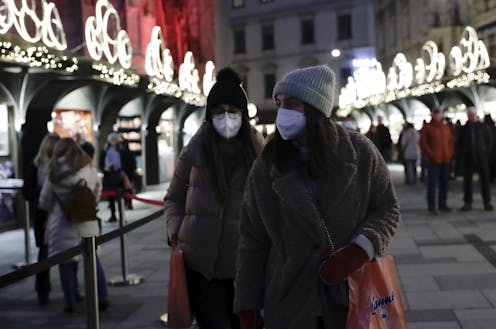Will Australia follow Europe into a fourth COVID wave? Boosters, vaccinating kids, ventilation and masks may help us avoid it
- Written by C Raina MacIntyre, Professor of Global Biosecurity, NHMRC Principal Research Fellow, Head, Biosecurity Program, Kirby Institute, UNSW

Europe is facing a fourth wave of COVID[1]. As we watch on, it is reasonable to ask whether Australia will be confronted with the same fate.
Several factors will determine this: vaccination rates, high uptake of third dose boosters, vaccination of children and whether a comprehensive strategy of ventilation with vaccine-plus[2] measures including masks, testing and tracing are used.
New OzSAGE[3] modelling for NSW shows possible[4] increasing cases from mid-December with a predicted peak in February 2022, despite high vaccination rates. OzSAGE warns if contact tracing is not maintained and children 5–11 remain unvaccinated, hospitals may be overwhelmed again. But if we vaccinate young kids and maintain high testing and tracing, the outlook is good.
If not for Delta …
If the ancestral strains of the virus that dominated infections in 2020 were still in pole position, we would now have COVID well controlled[5] in countries that achieved higher than 70% of the whole population vaccinated.
Unfortunately, just as the vaccines became available, new variants of concern began emerging. The currently dominant Delta variant raises the stakes because it is far more contagious and has some potential to escape the protection[6] offered by vaccines. This means we need very high rates of vaccination across whole populations – probably over 90% of everyone vaccinated including younger children – to control the virus.
In addition, we need to start thinking about “fully vaccinated” being triple, not double, vaccinated.
















